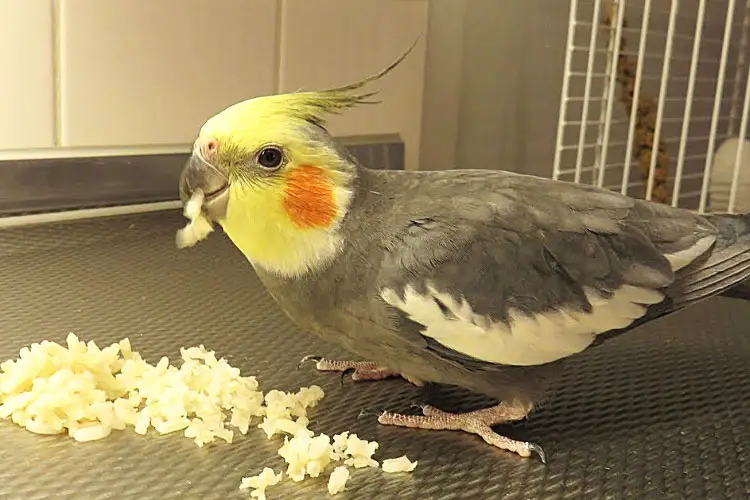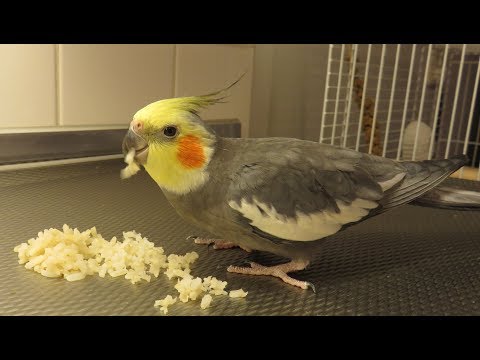If you pet a cockatiel, naturally, you’re bound to get curious about its food preferences. But feeding it might be costly if you only go for the fancy items.
At some point, you might’ve wondered, can cockatiels eat rice? Of course, they can! Feeding your cockatiel rice is an excellent dietary option, as they are nutrient-rich and digestion-friendly. But the type of rice and its quantity are sure to have an effect on your pet’s health.
With such wide varieties of rice available, how do you select the best rice for your beloved bird? Don’t worry; we got you covered! Read forth to know all about what type of rice to choose, where to get them and how to prepare it for your precious pet.
Can Cockatiels Eat Rice?
Cockatiels are mostly herbivorous and consume various greens, such as seeds, pellets, fresh fruits, and vegetables. Adding cooked rice to your cockatiel’s diet is a splendid idea. Raw rice, of course, isn’t a good idea.
Rice, in general, contains adequate calories and is vitamin-enriched. Some rice is healthier and has more nutrients than others.
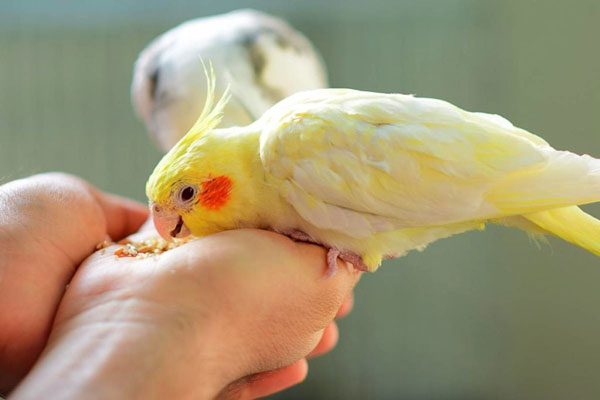
White rice, parboiled rice, basmati, jasmine rice, black rice, brown rice, sushi rice, valencia rice, and wild rice; there’s no shortage of rice varieties in the market. Among them, brown rice is the best option, followed by wild rice. Be sure to avoid heavily processed rice, as they lack nutrients and can be toxic for your pet in the long run.
Listed below are some of the types of rice that can be fed to your cockatiel and also the kinds of rice you should avoid:
Brown Rice
Brown rice is the most suitable choice as it is nutrient-enriched. It is a rich source of antioxidants (phenol and flavonoids, vitamin C, calcium, and magnesium), and fibers.
Wild rice
Wild rice provides a good source of protein and minerals like zinc, magnesium, potassium, and iron. It also contains vitamin E and K and is low in sodium and saturated fats.
White rice
Though white rice contains significantly fewer nutrients than compared to brown rice and white rice, it’s still a safe option.
It contains iron and vitamin B. White rice can often taste bland, so your pet might not prefer its taste.
Processed Rice
Any type of processed food, be it rice or any other item, is harmful to health. Processed items should be avoided at all costs.
Even though rice seems like a good option for your cockatiel’s diet, it should be consumed in moderation. Rice can be served as a special treat rather than a meal as it alone can’t fulfill all the nutritional requirements of your bird friend. It should be given along with other supplements of some fresh fruit and vegetables in order to maintain a healthy and balanced diet.
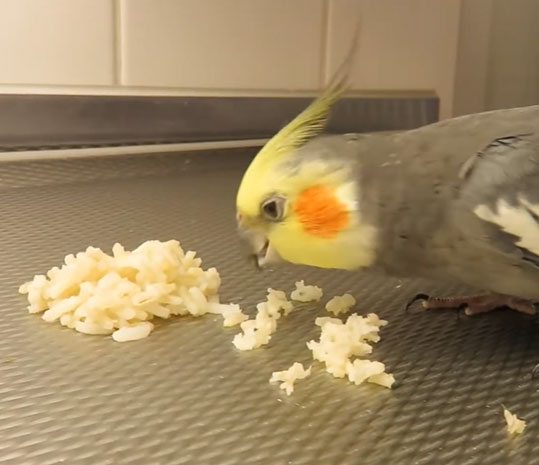
The rice can be consumed boiled according to the preference of your pet. Make sure not to add heavy seasonings, as birds can’t digest spices well.
If any sort of complication arises due to the consumption of rice, consult an expert or a vet without delay.
Do Cockatiels Like Rice?
As each bird is different in size, color, and shape, so are their tastes and food preferences. Even though cockatiels are less likely to be attracted to rice, you can experiment with different varieties of rice to see which type your pet likes best.
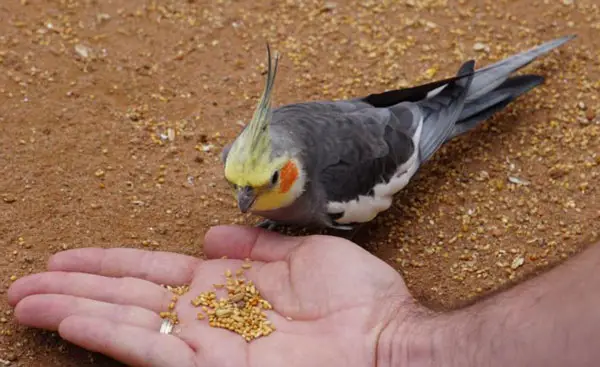
The rice can be mixed with other supplements from the cockatiel’s diet, like seeds or grains. Don’t force your pet to eat the rice if it refuses; just go back to its regular diet.
Health Benefits For Cockatiels Eating Rice
Rice is perfectly safe and healthy for cockatiels to eat as it is rich in vitamins, minerals, antioxidants, and proteins. It contains adequate calories, which gives sufficient energy. Nutrient-enriched rice keeps the body well-nourished, heals wounds quickly, and keeps the feathers silky and glossy.
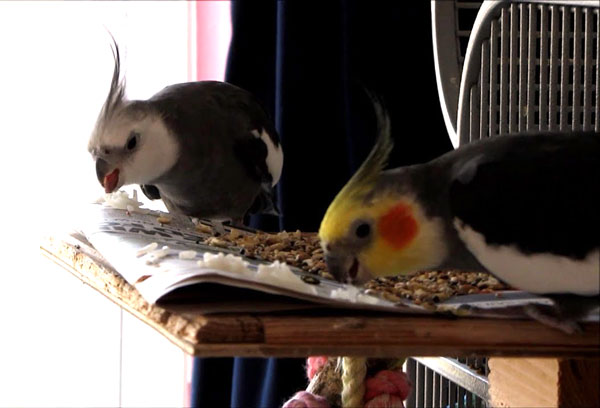
But rice should not be the sole source of nutrition. It should be given along with beans, seeds, pellets, grains, and the other regular items of the cockatiel’s diet. The amount of consumption is to be carefully supervised.
Health Risks For Cockatiels Eating Rice
Brown rice and wild rice are beneficial to health when eaten in moderation. Like everything, there should be a balance. Overconsumption of rice may lead to indigestion, weight gain, and other physiological imbalances.
It would be best if you avoided processed rice as they are low-nutrient. Digestive complications are most likely to occur; steer clear of them.
You must never season the rice with any spices, as the digestive system of cockatiels can’t handle them.
How Much Rice Should Cockatiels Eat?
From the discussion, you’re probably now psyched up to feed your beloved cockatiel rice, so that it can avail it’s numerous benefits. The right amount is anywhere from 5 to 6 grams of rice per week in your bird’s diet. This means, you can safely add about 500 mgs to 1 gram of rice to your bird’s diet everyday.
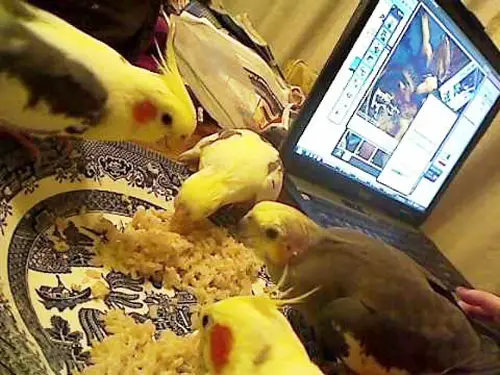
The numbers are precise and matter, because otherwise, your pet might have digestive issues, which we’ve discussed in the demerits. But paying proper care to the amounts will ensure that never happens.
Now, let’s come to preparing the tasty and healthy meal for your birdie.
How Do You Prepare Rice for Cockatiels?
Cooked rice is safe to eat for cockatiels. The rice can be boiled softly or soaked in water in order to avoid choking hazards. If uncooked rice is served, make sure to keep a bowl of water nearby to prevent dryness.
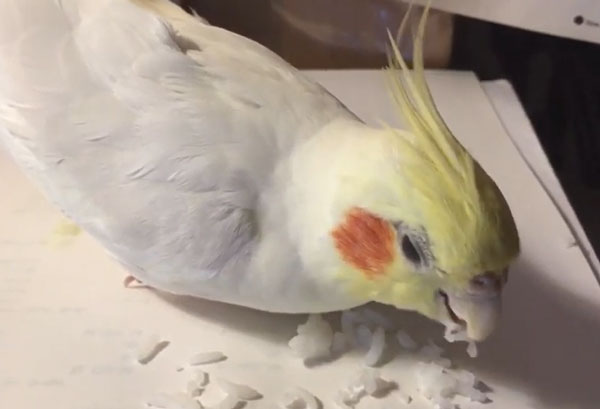
You should never use any type of spice or oil to season the rice, as cockatiels don’t have the same digestive layouts as humans. However, you can mix in seeds, beans, pieces of fruits, or nuts to avoid the dullness.
Can You Feed Rice to Baby Cockatiels? If so, How?
Generally, feeding baby cockatiels rice is not the brightest idea. The baby birds should first be accustomed to high nutrient foods like nuts, seeds, pellets, fresh fruits, and vegetables, as these are essential for their growth and development. Once the baby bird has matured, rice can be introduced as a snack.
Video Of A Cockatiel Eating Rice
Frequently Asked Questions (FAQs)
Since you’ve come to this part of the article, you’ve read the rest. However, here are some questions people ask each other on a regular basis.
You can get the rice in any grocery shop or local market. It can also be found in pet shops or, more specifically, bird shops. You can find it in a feed market too.
Rice is a carbohydrate, and its rampant consumption will definitely lead to weight gain. But a few grams per weak should be fine, so you don’t have to worry about your bird getting fat.
Consult an expert or a vet immediately. You should also remove rice from its diet if the problem continues.
Rice should be treated as a snack or with other nutritious dietary elements. Typically, 1-2 grams of rice mixed with seeds and vegetable is enough per serving. You should monitor your pet’s reaction to the item and check its stool for any complications.
Conclusion
So, the next time your cockatiel’s food palette looks bland, and you’re wondering, can cockatiels eat rice? you know just what to get for your adorable friend. Incorporate it into your pet’s diet slowly, and keep an eye out for its health.
As a final tip, we recommend you experiment and try out different varieties; you never know which one will become your cockatiel’s new favorite! Be open-minded, make small tweaks, and you’ll figure out which the best snack for your cockatiel is. Good luck!
Do you know if your cockatiels can eat strawberries or pineapple? Read our articles about it to learn more.
